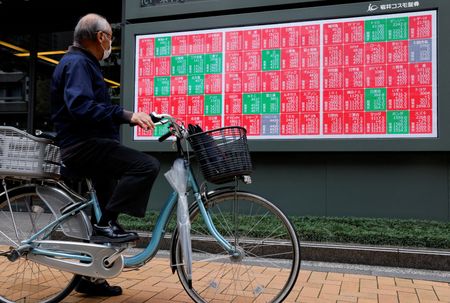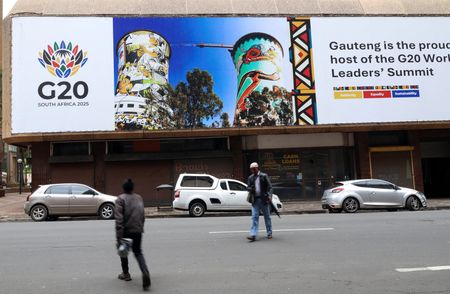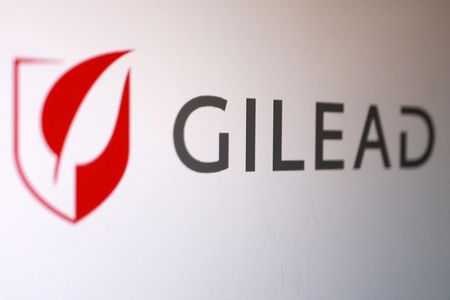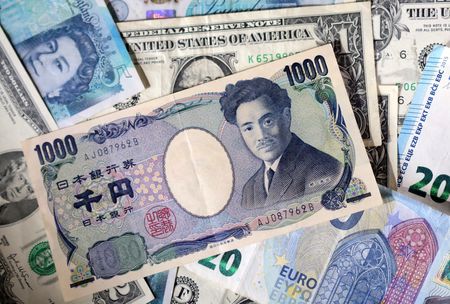By Scott Murdoch and Lucy Raitano
SYDNEY & LONDON (Reuters) -European shares fell on Tuesday, tracking losses in Asia, as investors turned cautious ahead of Nvidia’s earnings, seen as an important test for lofty AI valuations.
Hopes of imminent interest rate cuts from the U.S. Federal Reserve are fading and focus also centred on Japanese government bonds, which came under pressure on concerns over Prime Minister Sanae Takaichi’s massive stimulus plans.
Europe’s STOXX 600 fell 1.1% in early trading, taking its loss since Friday to 2.6% – its sharpest four-day drop since early April. The region’s volatility index touched its highest level in a month.
“There are plenty of excuses to take risk off the table – earnings from Nvidia tomorrow which are huge, payrolls on Thursday, and also I think there’s a general vibe of exhaustion,” said Michael Brown, senior research strategist at Pepperstone.
U.S. S&P 500 futures shed 0.3%. Analysts noted that on Monday the S&P 500 and Nasdaq closed below their 50-day moving averages for the first time since April 30.
Bitcoin earlier slid below $90,000 for the first time in seven months.
“It’s starting to feel like investor conviction at current levels is fading,” said Tareck Horchani, head of prime brokerage dealing at Maybank Securities in Singapore.
“It’s less about a sharp catalyst and more about positioning fatigue, valuation sensitivity, and a growing sense that the rally needs a pause,” he said.
NVIDIA ANTICIPATED
Chipmaker Nvidia’s quarterly earnings on Wednesday are hotly anticipated as investors look for any possible signs of weakening in the sector.
Markets took notice of news on Monday that tech billionaire Peter Thiel’s hedge fund sold off its entire stake in Nvidia during the third quarter.
Elsewhere Alphabet Chief Executive Sundar Pichai on Tuesday said no company would remain unscathed if the artificial intelligence boom collapses, as soaring valuations and heavy investment in the sector fuel concerns of a bubble.
Tech stocks in Asia were particularly hard-hit overnight, with SoftBank Group, chip-related Tokyo Electron and Advantest down between 3.7% and 7.5%.
“You’ve got waning enthusiasm around the whole AI frenzy, the narrative is increasingly one of questioning the spending as opposed to going “the more spending the better” which was the mood earlier in the summer,” said Pepperstone’s Brown.
Brown also highlighted the fact that big tech firms are increasingly tapping debt markets, with the trend leading investors to question the sustainability of big spending plans.
Amazon is the latest to join the pack, set to raise $15 billion from its first U.S. dollar bond offering in three years, according to a filing with the Securities and Exchange Commission on Monday.
JGBs SLIDE
“Typically when these risk-off events happen it’s initiated by the Fed and it gets extended on worries in Japan,” said Manish Kabra, lead U.S. equities and multi-asset strategist at Societe Generale, who noted that Japanese stocks sold off the hardest.
Japanese government bonds also slumped on worries about Prime Minister Sanae Takaichi’s ballooning spending plans.
Bank of Japan Governor Kazuo Ueda said on Tuesday he told PM Takaichi that the central bank was gradually raising interest rates to guide inflation smoothly towards its 2% target, in remarks that keep markets guessing on timing of hikes.
“Japan is the place that provides the carry trade and given where Japanese bond yields are… that really is the biggest disconnect of Japan being the only central bank not hiking substantially in the cycle,” said SG’s Kabra.
Ueda has signalled the chance of an interest rate hike as soon as next month. But Takaichi and her finance minister, Satsuki Katayama, have made clear their preference for rates to remain low until inflation durably meets the BOJ’s 2% target.
“My expectation is that another rate hike will be pushed into 2026. By the first quarter, the BOJ can wait for the outcome of more wage negotiations and it is a conservative organisation and they could continue to wait and see,” said Tai Hui, JPMorgan Asset Management’s chief market strategist for Asia.
Elsewhere, gold was down 0.1% to $4,040 an ounce while Brent crude futures slipped 0.4% to $63.92 a barrel.
Bitcoin was off 0.7% at $91,192 and down about 30% from its peak.
The dollar rose to a more than nine-month high against the yen before easing, while edging down versus the euro.
(Editing by Christian Schmollinger and Louise Heavens)










